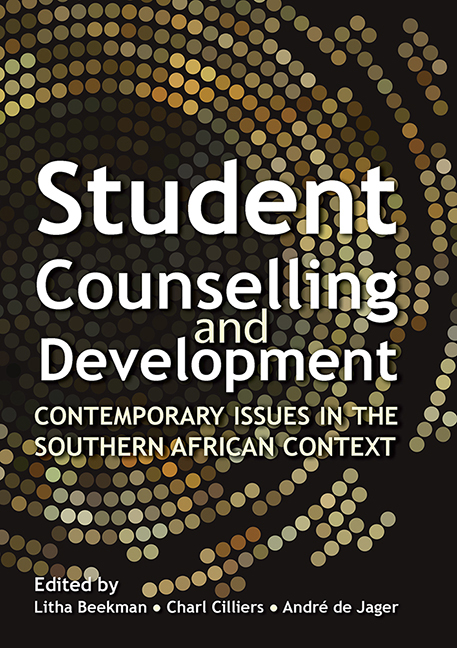Book contents
- Frontmatter
- Contents
- Figures
- Tables
- Preface
- Section 1 Development of Student Counselling and Development in Southern Africa
- Section 2 Theoretical Foundations of Student Counselling and Development in Higher Education
- Section 3 Services and Programmes Provided by Student Counselling and Development Units
- Section 4 Student Counselling and Development For Special Groups
- Section 5 Quality Assurance and Ethical and Professional Issues
- Contributors
- Index
Chapter 16 - Impact and Cost-Effectiveness of Student Counselling and Development Services: Pivotal Components of Quality Assurance
Published online by Cambridge University Press: 22 February 2020
- Frontmatter
- Contents
- Figures
- Tables
- Preface
- Section 1 Development of Student Counselling and Development in Southern Africa
- Section 2 Theoretical Foundations of Student Counselling and Development in Higher Education
- Section 3 Services and Programmes Provided by Student Counselling and Development Units
- Section 4 Student Counselling and Development For Special Groups
- Section 5 Quality Assurance and Ethical and Professional Issues
- Contributors
- Index
Summary
INTRODUCTION
In a local article, the pivotal role and function of centres or units for Student Counselling and Development (SCD) has been reaffirmed: “It has been shown through the review of both international and national research that there is not only a strong need for student counselling and development, but that tertiary institutions in South Africa cannot function without the service” (Botha, Brand, Cilliers, Davidow, De Jager & Smith, 2005, p. 84).
However, in a subsequent article the authors argue that this recognition necessarily calls for accountability from student SCD centres (Niemand, Brand & Cilliers, 2006).
RELEVANT UNDERPINNING FACTORS
Relationship between impact, cost-effectiveness, quality assurance and good management
Hoect (2006), Lategan (2000), Morrison, Brand and Olliers (2006), and Vuori (2007) maintain that impact and cost-effectiveness are strategic components of quality assurance, and that quality assurance should always be evident in good management practices. Impact and cost-effectiveness studies need to be performed in conjunction - the finding that a centre or unit has a positive impact but that it is too expensive to maintain is of no use.
Reality of professional and legal-ethical requirements
Apart from the fact that SCD centres or units should adhere to good management principles, they are also bound by certain professional, legal and ethical requirements.
Registered psychological practitioners (who are in most cases part of a team working at SCD centres or units) are, for example, required by legislation “to be accountable for professional actions in all domains of his or her professional life” (Government Gazette, 2006, p. 69). This implies that psychologists need to be accountable, not only to the university, centre or unit in which they work and to their clients, but also to themselves. Hoect (2006) refers to this accountability in all domains of professional life as “being transparent” and maintains that it will contribute to creating considerable trust in an organisation.
This accountability further requires that the psychological practice must be evidence-based (Allan, 2001), not only to clients, but also to ensure relevance (Macleod, 2004). Annexure 12 (Chapter 1) of the Health Professions Act of 1974 (Act No. 56) also stipulates this (Government Notice, 2006).
- Type
- Chapter
- Information
- Student Counselling and DevelopmentContemporary issuesin the Southern African Context, pp. 289 - 309Publisher: University of South AfricaPrint publication year: 2012



